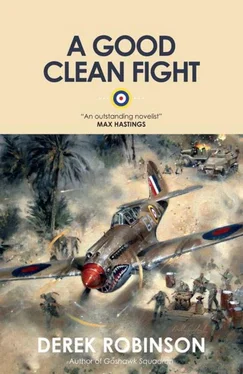“Why not?”
Schramm’s sleepy brain struggled to explain why not, and eventually succeeded. “Because,” he said, “it would be pointless for us both to do something different.” Now that he heard his explanation it seemed not quite right, but he couldn’t spot the fault. “Too confusing,” he said, and yawned.
“You know best,” the pilot said. “But if you think we’ll see much of anything in the desert at midday, you’d better think again.” He tested the engine until the Storch shuddered against its brakes, and then he let the revs fall to a grumble. “I’m told they built this thing out of what survived from three wrecks,” he said. “Sometimes she feels as if perhaps they lost a few bits. But you’re not interested in that sort of technical detail, are you? No. We might as well leave before one of you has a small heart attack.”
The Storch groaned and stumbled up to three thousand feet, hitting thermals that felt like hump-backed bridges. But once they were above the Jebel the air became cooler and smoother. The cockpit canopy had a canvas screen that kept the sun out; with the cabin ventilation wide open it was really quite pleasant. Schramm let his head rest against the side window and looked down on the landscape he had so painfully limped across: dusty green scrub and grass, red earth fields, gray stone outcrops, all of it split by hundreds of wrinkled wadis. It looked a bit like a very old, stained camel-blanket, dropped and forgotten. The window vibrated gently. It was a pleasant sensation. Schramm relaxed and enjoyed it.
* * *
Crossing the Tariq was a walkover.
Gibbon found the tracks the patrol had made when they came north and now they drove south, fitting their wheels into the same ruts. Dead easy. On the other hand there was a dead camel a hundred yards away providing breakfast for a dozen birds and a million flies, which probably meant it had trodden on a thermos bomb. Mike Dunn studied it through his binoculars and reported no evidence of the camel-owner. “I expect the birds ate him first,” Pocock said. “Bloody tough meat, camel.”
“Where on earth do the birds come from?” Dunn wondered.
“Same place as the flies,” Lampard said. “Nowhere and everywhere.”
“I wish something would eat the bloody flies,” Pocock said.
“My brother-in-law sold flypaper before the war,” said Blake, the fitter. “He could’ve made a fucking fortune out here.”
“Give me his address,” Dunn said. “I’ll get him flown out.”
“Too late. Fell down a hole in the blackout. Broke his neck.”
“Ah. Pity.”
“Flies didn’t think so. Best thing ever happened to them.”
It was about two hundred kilometers to Jalo. By mid-morning they were more than halfway there, which pleased Lampard. The more distance he put between the patrol and the Jebel, the greater would be the area that the enemy had to search. There was a danger in speed, in fact several dangers: the trail of dust announced their presence; the broken ground gave the tires and springs a continual beating; and men who had already driven through the night had to take the heat that came pounding down from the sky as well as the heat that hammered back from their engines, along with the eternal, smothering sandy dust that sought out their eyes and ears and nostrils like a plague of grit. Lampard took the risk of speed because he knew he must have the luxury of time when they crawled past Jalo Oasis. No plumes of dust near Jalo; no bellowing engines. The Italians who garrisoned Jalo were not famous for their aggression, but if they knew how small this patrol was, they might be tempted to come out and chase it. An Italian bullet could be as fatal as any other kind.
At the approaches to the Jalo Gap, Lampard called a halt for a brew-up. The rambling, uneven terrain that spread south of the Jebel was behind them now; they were back in desert, pure and simple, and the land was almost featureless. Heat hit the sand like a punishment and the sand just lay there and absorbed it, too dead to be killed any further.
The flies flew in from all quarters, buzzing with approval. These were the first white men for a week to sweat here. Lampard took a shovel, walked a hundred yards, dug a hole and squatted over it. His personal bodyguard of flies went berserk. He ignored them; he had long ago learned that you could never win the battle with the flies; the only sane thing was to forget them.
He was pleased to note that even from here the vehicles looked slightly soft and vague. The heat-haze that settled on the desert at midday was doing its stuff. It would get worse than this, until visibility fell to less than half a mile. Splendid. He filled in the hole and five hundred flies went to an early grave.
Sergeant Davis gave him a mug of tea, black as tar. Lampard added condensed milk, lots of it, and watched the colors swirl and jostle and blend. He drank. It tasted wonderful. “In the words of the poet,” he said, looking into his mug, “Earth has not anything to show more fair.”
“Oh, I dunno,” said Davis. “I knew a girl in Rotherham. Tits like coconuts.”
“What, all brown and hairy?” said Blake. He wrinkled his nose. “That’s not very nice.”
“How did he know?” Corporal Pocock asked Lampard.
“How did who know?”
“This poet bloke.”
“The name was Wordsworth,” Tony Waterman said.
Davis shook his head. “Not her in Rotherham, no. Her name was Prendergast, Maureen Prendergast.”
Dunn said: “Jerry must have told the Eye-ties at Jalo to watch out for us in the Gap. It’s the obvious thing to do, isn’t it?”
“How did Wordsworth know?” Corporal Pocock persisted.
“Jerry must have told him too,” Blake said.
“If the Eye-ties come out from Jalo to get us, we run for it,” Lampard said. “Flat out.”
“I mean, it’s just his opinion, isn’t it?” Pocock said. “Just Wordsworth’s opinion, that’s all. I mean, he didn’t know everything, did he? Earth has not anything to show… How the hell did Wordsworth know what Earth had to show? Probably never been east of Hackney in his whole life.”
“They wouldn’t see anything from Jalo,” Dunn said. “Not this time of day.”
“I bet Wordsworth hadn’t seen Jalo, for a start,” Pocock said.
“I tell a lie,” Davis said. “Her name was Pickering. Her in Rotherham. Maureen Prendergast lived in Barnsley. I preferred Muriel Pickering, myself. Tits like melons.”
“People shouldn’t make sweeping statements,” Pocock said. “Not unless they got proof.”
“I suppose we ought to make allowances for Wordsworth,” Waterman said. “He never knew when to stop. He was the bloke who wrote: ‘and then my heart with gladness fills and dances with the daffodils.’”
“He wouldn’t have liked it here,” Davis said. “Too hot to dance.”
“I knew a Pickering once,” Blake the fitter told Davis. “Not Muriel, though.”
“I reckon anyone who dances with the daffodils must have a few tiles off his roof,” a trooper called Smedley said.
“You’re thinking of Doris. Muriel’s sister. Went to live in Pontefract. Doris Pickering,” Davis said. “Tits like turnips.”
“Let’s go,” Lampard ordered. The fire was out, the gear was loaded.
“Tell me, sergeant,” Gibbon said. “Purely for my information: given the choice, would you prefer tits, or fruit and vegetables?”
“That’s what I ask myself every night, before I go to sleep,” Davis said. “Tits or turnips? Turnips or tits? I could murder a nice juicy turnip now, but on the other hand…” He stopped because they had all stopped.
Airplane.
Nobody spoke. The easy-going buzz, too thin to be a bomber, too slow to be a fighter, could only be a Storch, dribbling along at three or four hundred feet, and it had to be looking for them.
Читать дальше












